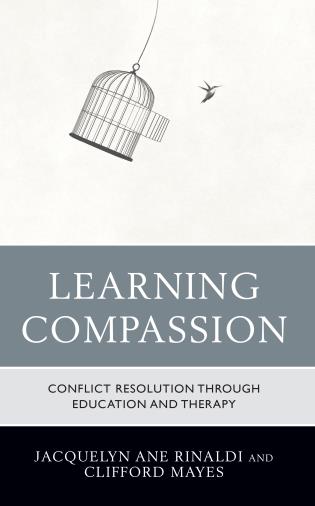
Book Title: Learning Compassion: Conflict Resolution Through Education and Therapy
Year Published: 2022
Learning Compassion: Conflict Resolution Through Education and Therapy
This book discusses the relationship between compassion and peace with a special emphasis on the role that therapy and education can play in promoting a state of affairs in which, as humanity becomes more compassionate, peace becomes more possible.
Learning Compassion is unique in that it does not demonize principled militaristic views of human nature and the inevitability of war. We do not summarily disregard war as just a vast historical “mistake,” nor do we argue in an excessive optimism that humanity could abolish war if only it took the proper view of things and resolved to repent and reform on the spot. As relatively conservative academics, we are suspicious of simplistic liberal panaceas for the programmatic betterment of humankind.
Rather, although we generally raise our voice against warfare, we allow the possibility of a just war that must be fought. Only, we argue that such a war must be a very rare occurrence; a matter of constant critical reassessment while in progress; carried on in the most humane and circumspect fashion possible; and resolved as quickly as possible by diplomatic means.
In general, however, we do argue for an increasing move away from warfare in our ongoing collective evolution. We do this not because tension and disagreement in human affairs is eradicable but precisely because it is not, which leads to the project that engages us in this book—the humane containment of that tension in dialectical processes that are creative and productive.
We contend this can occur with increasing frequency through: 1) depth-psychological work on oneself (especially the recognition and sane integration of one’s shadow so as not to project it onto a putative “enemy”); 2) the integration of complex, even contradictory, aspects of oneself in the service of a non-judgmental view of one’s and others’ complexity—tolerance, in short; 3) the use of meditative modalities to accomplish all of this in the quasi-religious frameworks of Buddhism primarily and also certain structures and principles of the Judeo-Christian tradition, and 4) the shaping of the child through educational processes that are holistic and psychospiritually sound. The two sites where this can best be accomplished, we contend, is in the psychoeducational venues of the consulting room and classroom.
About Jacquelyn Rinaldi
Jacquelyn Rinaldi received her doctorate in mythological studies and depth psychology from Pacifica Graduate Institute. Her teaching incorporates self-awareness as a key to humanity’s next evolutionary step. She is currently completing her second doctorate in clinical psychology at California School of Professional Psychology. In addition, she has earned a certificate from Stanford University in Compassion Cultivation Training. She has also completed a 2-year mindfulness teacher training program through Greater Good Science Center at the University of California, Berkeley.
Jacquelyn’s teachings incorporate deepening self-awareness as a key to achieving more psychological wholeness. Living with more psychological wholeness directly affects how we govern, lead, teach, manage, inspire, parent, and relate in our personal and professional relationships. The more self-aware we are, the more apt we are to choose assertive, wholehearted, compassionate responses when challenging situations arise. As we deepen our self-awareness, we also develop greater clarity, compassion, and resilience.
Jacquelyn has a coaching practice as well as works as a supervised psychotherapist; in her coaching and therapy work she is enthusiastic about helping clients reach their full potential. Her approach to supporting growth in clients is to create opportunities for clients to see a wider perspective. As we understand the pushes and pulls from within our psyche, we often begin to question our automatic responses, creating a wider view that makes new choices more clear and different outcomes possible. When these automatic responses remain unconscious, they often create thinking patterns that limit our success, through therapy and hard work outcomes change.
In addition to Learning Compassion, Jacquelyn is the co-editor of New Vision and New Voices: Extending the Principles of Archetypal Pedagogy to Include a Variety of Venues, Issues, and Projects, Vol 2 which is currently in press with Rowman & Littlefield. She authored a chapter in the book titled, Educating for Integration, Not Annihilation. In addition, she is developing a family mindfulness program synthesized from the fields of mindfulness, parenting, and family systems psychology with the goal of develop a teaching model that supports emotion regulation in children and their parents. The research for this project has been presented at the APA Division 43: Family, Couple, and Child Conference 2022 in Los Angeles. Jacquelyn is also a lecturer for the Psychology and Humanities Department at the College of Southern Nevada and enjoys speaking and offering workshops for a variety of audiences.




